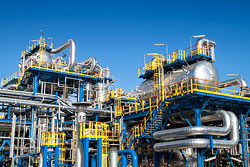Kynar Corrosion Resistant Coating

Kynar powder coating provides a corrosion resistant protective coating of from .015 to .050 inches in thickness, impervious to a wide variety of corrosive environments up to 300°F, and in addition has excellent mechanical properties, such as impact resistance.Kynar is a flourocarbon thermoplastic resin (PVF2, polyvinylidene flouride).
Chemical Resistance
Kynar has outstanding resistance to most in organic acids, alkalies, aliphatic and aromatic hydrocarbons, organic acids, alcohols, halogenated solvents, halogens and strong oxidizing agents.
Spool piece tests of over 11,000 hours in 36% Hydrochloric acid, 93.6% Sulfuric acid and 40% Nitric acid at a temperature of 71°C (160°F), at 150 psi pressure, showed no permeation or degradation of Kynar. A similar test of 9,000 hours in 36% Hydrochloric acid at a temperature of 104°C (220°F) also showed no permeation or degradation.
Kynar provides an excellent pin-hole free permeation barrier to small molecules. Access to a Kynar coated substrate by corrosives is effectively prevented. Water permeability of polyvinylidene flouride according to ASTM E-96 (gram) (mil) (100in²) (24h) (atm) at 25°C (77°F) is 1.56.
Hot fuming Sulfuric acid, some strong basic amines, hot concentrated alkalies and alkaline metals can cause degradation. Slight swelling may occur with use in highly polar solvents, such as acetone and ethyl acetate.
Physical Properties
Kynar has excellent bonding between molecules and shows good mechanical properties in elongation, flexure, tension, compression and impact.
The tensile yield strength is 575kg/cm° (8000 psi), the highest of any of the flourinated polymers. See graph below.
Kynar has a high heat distortion temperature. Creep resistance is good. At a stress of 140 kg/cm° and a temperature of 25°C, the creep rate is 1.5%.
The use temperatures where Kynar can be used range from -20°C (-4°F) to 150°C (302°F). Thermal treatment, such as post-curing, can extend these limits from -60°C (-76°F) to 170°C (338°F).
Fire Resistance
In actual ASTM D 635 Tests, Kynar does not burn freely and self-extinguishes on removal of the flame. It has an oxygen index of 43 (minimum quantity of oxygen, expressed in %, in an atmosphere in which burning could occur), meaning KF will not burn in a normal atmosphere.
UV and Gamma Radiation Stability
Weathering and aging resistance are excellent. Kynar shows good gloss holding capacity against ultra-violet radiation. Weatherometer tests indicate no decrease in tensile strangth after exposure to ultraviolet radiation for 3,000 hours.
After exposure to 100 megarads of electromagnetic radiation, Kynar showed no decrease in tensile strength.
Kynar's stability under ulltraviolet and gamma radiation is unsurpassed by other plastics.
For more specific information on the Physical Properties of KF, see Table 1.
Food Processing Use
FDA. Kynar conforms to FDA requirements and may be safely used as articles or components of articles intended for use in contact with food. Use environments involving food acids and caustic cleaning at elevated temperatures can be handled. Requirements for food use may be found in the code of Federal Regulations, 21, Food and Drugs, Part 177.2510.
USDA. Kynar is chemically acceptable for application to surfaces where there is apossibility of incidental contact with meat or poultry food products prepared under Federal inspection.
| Property | Condition | Unit | Method (ASTM) | Kynar Polymer |
|---|---|---|---|---|
| Mechanical | ||||
| Tensile strength | 23 C | kg/cm2 | D638 | 500 600 |
| 100 C | kg/cm2 | D638 | 200 300 | |
| Elongation | 100 C | % | D638 | 200 300 |
| Compressive Strength | kg/cm2 | D695 | 900 1000 | |
| Flexual Strength | kg/cm2 | D790 | ||
| Tensile Modulus | 103 kg/cm2 | D638 | 12 14 | |
| Compressive Modulus | 103 kg/cm2 | D695 | 10 14 | |
| Flexural Modulus | 103 kg/cm2 | D790 | 16 18 | |
| Izod Impact Strength | Notched, ½" x ½" | Ft. lb in of notch | D256 | 1.8 2.2 |
| Rockwell Hardness | D785 | R 110 | ||
| Abrasion-Tabor Test Method | Abrasion Disk CS-17, Load 1kg | mg/1000 cycles | 9.3 | |
| Thermal | ||||
| Thermal Conductivity | 10-4 cal/sec/cm2/1(°C/cm) | C177 | 3.0 | |
| Specific Heat | Room Temp | cal/°C | 0.33 | |
| Thermal Coefficient of Linear Expansion |
10-5/°C | D696 | 12 | |
| Head Distortion Temp | 4.6kg/cm2 | °C | D648 | 150 |
| 18.5kg/cm2 | °C | D648 | 98 | |
| Electrical | ||||
| Volume Resistivity | 50%RH/23°C | ohm-cm | D257 | 3~6x1014 |
| Dielectric Strength | Short Time, 3.18mm | KV/mm | D149 | 10 |
| Dielectric Constant | 60Hz | D150 | 9.8 | |
| 103Hz | 9.5 | |||
| 106Hz | 7.5 | |||
| Dissipation Factor | 60Hz | D150 | 0.05 | |
| 103Hz | 0.018 | |||
| 106Hz | 0.16 | |||
| Other Properties | ||||
| Specific Gravity | D792 | 1.76 1.77 | ||
| Water Absorption | 24hrs, 3.18mm | % | D570 | 0.03 |
| Melting Point | °C | 185 | ||
| Decomposition Temperature | °C | 350 | ||
| Crystallization Temperature | °C | 140 | ||
| Flammability | D635 | Self-extinguishing |
Caution
Kynar is non-toxic in the polymeric state, however, its principal thermal decomposition product, hydrogen flouride, is toxic. Precautions should be taken to prevent inhalation and physical contact should inadvertent decomposition of Kynar occur. Waste Kynar or coated parts should not be incinerated without adequate fume disposal facilities.